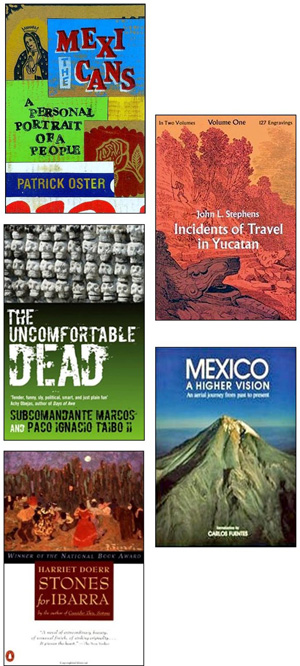
|  |  |  Entertainment | Books | February 2009 Entertainment | Books | February 2009  
Mexico Book Club's February Book Recommendations
 Ed Hutmacher - MexicoBookClub.com Ed Hutmacher - MexicoBookClub.com


| | For more information on these or other books with Mexico-related themes, please visit MexicoBookClub.com. |  |
Interested in a journalist's take on Mexicans' lifestyle? How about a 19th-century adventure tale about the lost cities of the Mayans? Maybe a best-selling crime thriller co-authored by two notable Mexican luminaries? Or perhaps a semi-autographical novel about life and self-discovery? A coffee-table book filled with stunning aerial photography?

Whatever your tastes in a good read, here's a handful of book recommendations that will satisfy your curiosity about Mexico and its people.

The Mexicans: A Personal Portrait of a People by Patrick Oster (1989; Non-Fiction). Patrick Oster was an accomplished journalist with little previous exposure to Mexico when he was assigned to Mexico City’s Knight-Ridder News bureau as a reporter during the 1980s. He used his assignment to collect impressions and stories about the kinds of people that neither U.S. officials nor tourists are likely to meet: a garbage picker, a cop, a homosexual, a barrio doctor, feminists, politicians, intellectuals, farmers, expatriates, and even one of the children of Sanchez—the Mexican family made famous by Oscar Lewis' classic. Oster's short vignettes and biographies vividly captures a country in crisis—poverty, class tensions, political corruption—as told through the stories of individuals, and reveal something vital about Mexico that helps to understand why many decide to risk their lives in order to have the opportunity to live in the United States.

Incidents of Travel in the Yucatan by John L. Stephens; Illustrations by Frederick Catherwood (1963; Non-fiction). Originally published in 1843, this is one of the great books of archaeological discovery, and at the same time one of the few really absorbing books of travel and exploration. Stephens found and described 44 Maya sites during his early 19th-century Yucatan travels. His account of these "ruined cities" remains one of the most authoritative in existence; he was one of the first white explorers who trekked the Yucatan jungles to literally uncover and inspect the remnants of Mayan civilizations. His prose is penetrating and alive whether depicting a feast day in Merida, the ferocity of a bullfight or the pathos of an Indian burial. Frederick Catherwood's illustrations enhance the overall appeal of the book. These are highly exact and realistic drawings showing ancient ruins, interior and exterior views of Maya tombs, hieroglyphics and drawings found on the walls of Maya temples.

The Uncomfortable Dead by Subcommandate Marcos and Paco Igancio Taibo II (2006; Fiction). This book was a best-seller in Mexico and throughout most of Latin America, perhaps because of its unusual co-authorship: the mysterious Zapatista freedom-fighter Marcos and the best-selling novelist Taibo. Rather than collaborating on a single narrative thread, the authors alternate writing chapters! This unusual methodology would make the book a mere curiosity if it was a run-of-the-mill murder mystery but, luckily for us, it is much more. A contrasting pair of investigators, the world-weary Héctor Belascoarán Shayne, hero of many a novel by Taibo, and Elías Contreras, a Zapatista detective, are tasked with finding missing persons in the Zapatista-controlled regions. A central plotline concerns a far-Right conspiracy involving a sinister individual called Morales, which inevitably lead to Elías and Hector joining forces in Mexico City to solve a mystery that stretches into every corner of government activity. With an open mind for the bizarre, readers will find this book witty, crafty, political and just plain fun.

Stones for Ibarra by Harriet Doerr (1983; Fiction). This now classic book is the story is about Richard and Sara Everton, "two North Americans just over and just under forty, come to spend their lives in Mexico and already lost as they travel cross-country over the central plateau." The adjustments the San Francisco couple must make to live amongst Ibarra’s natives is nothing compared to what they learn about themselves. What’s remarkable about Doerr’s novel (winner of the 1984 American Book Award) is that it is a sad book written with such vibrant beauty, one can’t think of is as sad. For all sorts of reasons, we travel to certain places for the same reason we trust ourselves to certain people: they answer our need for something so foreign we can explore it without having to explain it. Life needn’t be hopeless, but it may take a journey to a different land to make us understand its marvels. Doerr’s wonderful, semi-autographical tale of discovery will open eyes and awaken the senses.

Mexico: A Higher Vision — An Aerial Journey from Past to Present Text and Photography by Michael Calderwood; Introduction by Carlos Fuentes (1992; Non-Fiction). From sun-baked desert to emerald jungle, over Aztec ruins and past snow-capped volcanoes, this coffee-table book of aerial photographs shot high above Mexico is an equally magnificent overview of Mexico. Carlos Fuentes writes in the book’s introduction, "To see Mexico from the air is to look upon the face of creation," and readers won’t be able to escape the feeling that Calderwood’s dazzling photography indeed reveals a country that seems to belong to an earlier, more elemental world. Viewing Mexico’s magnificent landscape and landmarks via Calderwood’s stunning aerial photography is awe-inspiring, if not outright humbling.

Ed Hutmacher is Editor in Chief of Mexico Book Club. For more information on books with Mexico-related themes, visit the website at MexicoBookClub.com. |

 |
|  |



